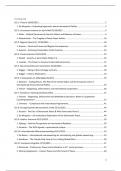Samenvatting
Samenvatting alle teksten TIB
Samenvatting van alle teksten te kennen voor het examen Theorieën van de Internationale Betrekkingen van Professor De Bièvre in het eerste semester van de master Internationale Betrekkingen en Diplomatie academiejaar 2023/2024
[Meer zien]



